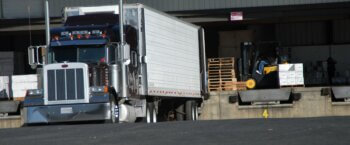Freight Fraud: How Brokers Can Avoid This Common Threat

Vetting Carriers is Easier
With Risk Factors
Start a FREE 14-day trial.
Transportation industry insiders have seen a dramatic surge in freight fraud and theft over the past few years. Scammers have become increasingly sophisticated at defrauding brokers and stealing cargo, causing enormous financial losses for brokers and shippers.
Here are the primary threats facing the freight industry and the potential implications of freight fraud on your business.
Rise in opportunity for scammers
Freight brokers might be tempted to assume that any carrier listed on the Federal Motor Carrier Safety Administration’s (FMCSA) registration system is legitimate. However, the FMCSA recently acknowledged that its registration system is outdated and needs an overhaul to control fraud.
While the FMCSA plans to improve processes for verifying identities and businesses to keep “bad actors” out of the system, brokers can’t solely rely on that. Until changes are implemented, brokers will need to be vigilant to protect their interests.
“Fraud cases continue to escalate as the market experiences significant fluctuations. Bad actors are getting more savvy on how they obtain information to defraud brokers and truckers,” said Julia Laurin, chief product officer at Truckstop.
Here are the top threats to be aware of and ways freight brokers can avoid falling victim to them.
Cargo theft in supply chains
Cargo theft is nothing new, but the tactics thieves use to steal cargo are becoming more strategic. They often circumvent the carrier vetting process by taking on the identity of a legitimate trucker or contacting brokers directly with available capacity. Brokers are typically unaware they’ve been scammed until their customer tells them the cargo hasn’t been delivered. To make matters worse, cargo theft continues to be highly underreported, which only enables criminal activity to continue.
These big fraudulent hits are financially devastating and can destroy a broker’s business. Criminals target areas of weakness within the supply chain, including brokers, drivers, shippers, and warehouse facilities, to carry out their activities.
Brokers can and should protect their cargo by taking extra precautions, even if it slows down processes.
Security measures to avoid cargo theft:
- Thoroughly vet every carrier, every time. Dig into all the details to ensure the carrier is who they say they are.
- Verify the carrier’s authority and DOT number.
- Use additional vetting tools, such as Truckstop’s RMIS Onboarding and Monitoring and Risk Factors.
- Confirm insurance coverage and get a copy of the insurance certificate.
- Check that the carrier is licensed to transport specific types of freight.
- Confirm the carrier’s phone number and call the carrier directly to verify accuracy before booking a load.
- Make sure the email address matches what’s listed on the carrier’s registered authority.
- Improve freight visibility by using electronic logging devices (ELDs) or GPS tracking to view the freight’s location in real time.
- Plan routes to avoid high-risk areas. If they are unavoidable, instruct the driver to stop for fuel outside of high-risk zones.
- Use a private load board with additional data security such as two-factor or multifactor authentication.
- Use additional security. Locks may seem unsophisticated but are an additional hurdle for thieves.
- Maintain records of the truck, including its DOT number and VIN, along with photos.
- Ask questions if something looks suspicious (like a driver using a day cab for a three-day haul).
Double-brokering
Double-brokering happens when a carrier accepts a load from a broker and then illegally transfers, or re-brokers, the load to another carrier to complete the haul without notifying the original broker or shipper.
This can result in the cargo being transported by a carrier that lacks proper authority or insurance, or it may not be delivered to its destination at all. It also voids the shipper’s agreement leaving all parties involved open to significant financial risks, insurance liability, and irreversible reputation damage. This can result in the permanent loss of FMCSA authority.
Brokers may not become aware a load has been double-brokered until there is a problem, and tracking down the guilty party can be difficult.
In today’s down market, fraud complaints like double-brokering are only expected to increase.
Ways to detect and prevent double-brokering
- Properly onboarding and monitoring carriers with software tools can help keep you one step ahead of fraudsters. Bad actors can be tricky, so take time to dig into details such as credit history, tenure, inspection records, and CSA scores.
- Working with carriers you know and trust decreases the risk of fraud. This makes building solid relationships crucial.
- Create open and clear communication that benefits both parties. Transparency creates trust and helps you create a network of reliable carriers you can count on.
- If you suspect a double-brokering situation, hold payment until you can verify. Once the payment goes out, you are unlikely to recover what you’ve lost.
Identity theft
Identity theft, including unauthorized load brokering and impersonation using USDOT numbers, can be difficult to detect. Criminals can intercept sensitive data transmitted over digital channels, and use that information to impersonate an actual carrier. They may also use “phishing” scams to trick brokers into sharing information, then hire a trucking company as if they’re a broker, defrauding the carrier.
One of the best ways to prevent identity theft is to improve the security of digital transactions. Use strong passwords and two-factor authentication for email and other platforms that contain sensitive information.
Keep in mind that “deep fake” technology makes it easy for anyone to impersonate the voice of someone you know. Added security layers like RMIS alert you to any phone calls coming from a VoIP device so you can proceed with caution and be aware of potentially fraudulent activity.
Protect your interests
It’s crucial to take preventative measures to safeguard your assets, reputation, and integrity from falling prey to freight fraud. Knowing the tactics criminals use, and taking time for due diligence can help you avoid freight fraud. And remember, trust your instinct if something looks suspicious.
Truckstop RMIS Carrier Onboarding helps you quickly and accurately qualify carriers, minimizing your risk of fraudulent activity. Get daily status updates, change notifications, and carrier directory sourcing tools to save you time and protect your business.

Find out how our platform gives you the visibility you need to get more done.
Get helpful content delivered to your inbox.
Schedule a demo.
Find out how our platform gives you the visibility you need to get more done.





